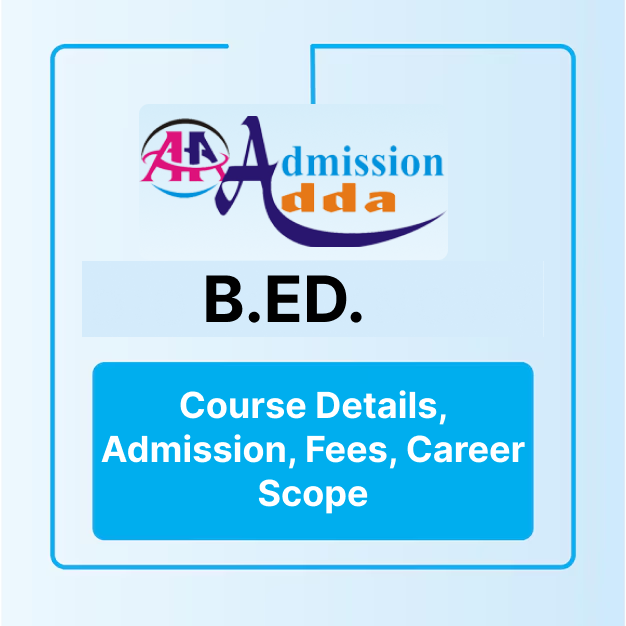Nursing
Para Medical
Other Courses

Duration
2 year
Course Information
The B.Ed course is a transformative two-year undergraduate degree that opens doors to a noble teaching career. For aspiring educators in Bihar looking to shape young minds, the b.ed entrance exam 2025 is your gateway to prestigious government colleges. Through Admission Adda's guidance, you can turn your dream of becoming an impactful teacher into reality. The b.ed program equips students with essential skills through comprehensive topics like teaching pedagogy, curriculum development, and educational psychology. You'll master instructional tactics, subject-specific training, and innovative teaching-learning techniques. The course also covers crucial aspects like classroom management, helping you become a confident and effective educator. Join us at Admission Adda to embark on this meaningful journey. We're committed to helping every student in Bihar access quality education and build rewarding careers in teaching.
The B.Ed course (Bachelor of Education) is a transformative degree program designed for aspiring teachers who dream of shaping young minds. This professional qualification has been the foundation of teacher education across India, equipping educators with essential classroom skills and pedagogical expertise.
To join a B.Ed program, candidates typically need a bachelor's degree in any discipline. While admission criteria may differ across institutions, most reputed colleges in Bihar conduct a B.Ed entrance exam in 2025 for selection. Some institutions may value prior teaching experience.
At Admission Adda, we understand your passion for teaching and help you secure admission in top government B.ed colleges in Bihar, turning your dream of becoming an educator into reality.
We believe every aspiring teacher deserves quality education to build their career. Let us guide you through the B.Ed course details, including comprehensive fee structure and program benefits, to help you make an informed decision.


Considering a B.Ed degree? It's more than just a teaching qualification - it's your pathway to shaping young minds in Bihar and beyond. At Admission Adda, we believe every aspiring teacher deserves the chance to fulfill their dreams through the B.Ed entrance exam 2024.
| B.Ed Full Form | Bachelor of Education |
| B.Ed Duration | 2 Years |
| Age Criteria | 21+ |
| Eligibility Criteria | Graduation in any Field |
| Admission Process | Merit-Based and Entrance Based |
| Average Fees | INR 5,000 - INR 2,00,000 |
| Job Roles | Primary School Teacher, Head Teacher, Teacher Assistant, Social Worker, High School Principal |
| Average Starting Salary | INR 25,000 - INR 50,000 per month |
The B.Ed course admission follows two main pathways: entrance exam-based and merit-based selection. When entrance exams aren't conducted, students can secure admission based on their graduation performance, making their dreams of becoming educators possible.
For the B.Ed entrance exam 2025, most states conduct their separate entrance tests. This systematic approach ensures each state maintains an adequate pool of qualified teachers for their educational institutions.
While specific requirements may vary across different colleges and states for the B.Ed course, some fundamental criteria remain standard:
Keep these essential points in mind while pursuing B.Ed admission:
The B.Ed syllabus is spread across 2 years (4 semesters).
| B.Ed Syllabus 1st Semester | B.Ed Syllabus 2nd Semester |
|---|---|
| Childhood and Growing Up | Learning and Teaching |
| Contemporary India and Education | Pedagogy of School Subject-1 – Part II |
| Language across the Curriculum | Pedagogy of School Subject-2 – Part II |
| Pedagogy of School Subject-1 – Part I | Knowledge and Curriculum |
| Pedagogy of School Subject-2 – Part I | Assessment for Learning |
| Understanding ICT and Its Application | School Attachment |
| School Exposure | Community Living Camp |
| Field Engagement Activities | - |
| B.Ed Syllabus 3rd Semester | B.Ed Syllabus 4th Semester |
|---|---|
| Pre-internship | Gender, School, and Society |
| Internship | Reading and Reflecting on Texts |
| Engagement with the Field: Tasks and Assignments related to the internship | Arts in Education |
| - | Understanding the Self |
| - | Creating an Inclusive School |
| - | Health, Yoga, and Physical Education |
| - | Engagement with the Field: Tasks and Assignments |
| B.Ed in Hindi | B.Ed Physical Science |
| B.Ed in Computer Science | B.Ed Psychology |
| B.Ed Special Education | B.Ed Physical Education |
| B.Ed in Sanskrit | B.Ed Economics |
| B.Ed English | B.Ed Mathematics |
| B.Ed Commerce | |
The B.Ed course (Bachelor of Education) is a transformative journey that molds aspiring teachers into skilled educators. This professional degree not only imparts teaching methodologies but also nurtures essential communication and interpersonal skills, enabling teachers to connect with students on a deeper level and shape their futures.
At Admission Adda, we understand your aspirations and are committed to helping you secure admission to Bihar's prestigious government colleges. Let us guide you toward your teaching dreams through quality B.Ed education.
| Steps | Description |
|---|---|
| 1. Eligibility Check | Candidates must have a recognized undergraduate degree with a minimum percentage. Some programmes may have additional requirements. |
| 2. Application Submission | Submit application forms with relevant documents and fees before the deadline. |
| 3. Entrance Examination | Many institutions conduct entrance exams to assess aptitude, subject knowledge, and teaching skills. |
| 4. Counselling and Interview | Shortlisted candidates attend counselling or interviews to evaluate their suitability for the programme. |
| 5. Merit List and Admission Offer | Successful candidates receive admission offers based on entrance exams and interviews. |
| 6. Document Verification and Fee Payment | After accepting the offer, candidates undergo document verification and pay the course fees. |
| 7. Commencement of Classes | Orientation sessions precede regular classes, marking the start of the B.Ed programme. |
| Exam Name | Description |
|---|---|
| Common Entrance Test (CET) | State-level entrance exams commonly used for B.Ed admissions in various states. |
| Graduate Aptitude Test in Education (GATE) | Aptitude test to assess candidates for graduate-level education courses. |
| Central Teacher Eligibility Test (CTET) | A national-level exam conducted to determine candidates' eligibility for teaching positions. |
| State-level B.Ed Entrance Exams | Specific entrance exams conducted by different states for B.Ed admission. |
| University-specific Entrance Exams | Entrance exams conducted by individual universities to evaluate applicants for their B.Ed programmes. |
| International B.Ed Entrance Exams | Exams conducted by international universities for B.Ed courses abroad. |
Need Help? We’re Available Anytime, Anywhere, 24/7.
© Copyright Admission Adda All Rights Reserved